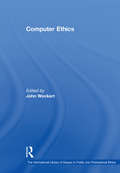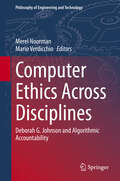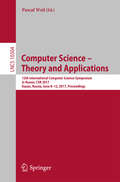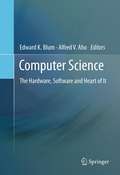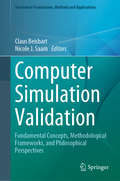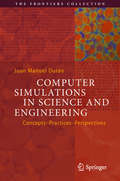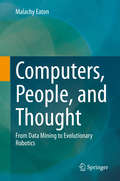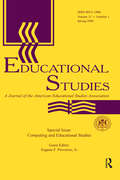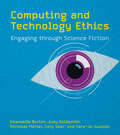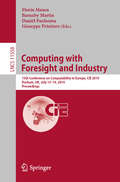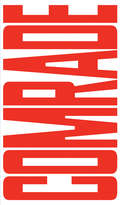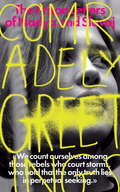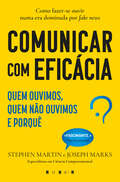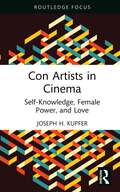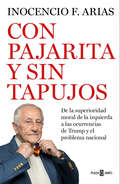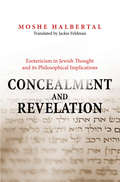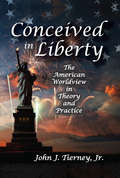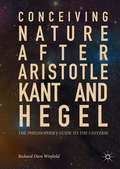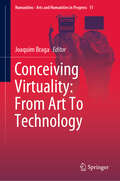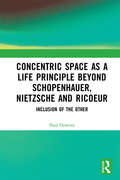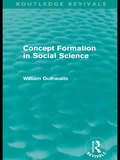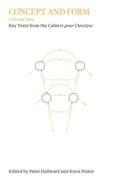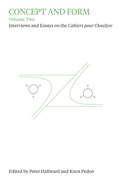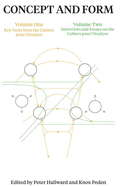- Table View
- List View
Computer Ethics (The International Library of Essays in Public and Professional Ethics #No. 4.)
by John WeckertThe study of the ethical issues related to computer use developed primarily in the 1980s, although a number of important papers were published in previous decades, many of which are contained in this volume. Computer ethics, as the field became known, flourished in the following decades. The emphasis initially was more on the computing profession: on questions related to the development of systems, the behaviour of computing professionals and so on. Later the focus moved to the Internet and to users of computer and related communication technologies. This book reflects these different emphases and has articles on most of the important issues, organised into sections on the history and nature of computer ethics, cyberspace, values and technology, responsibility and professionalism, privacy and surveillance, what computers should not do and morality and machines.
Computer Ethics Across Disciplines: Deborah G. Johnson and Algorithmic Accountability (Philosophy of Engineering and Technology #44)
by Merel Noorman Mario VerdicchioThis edited volume brings together philosophers and scholars in disparate fields who have engaged in Professor Deborah G. Johnson’s body of work throughout her long career. It appeals to both students and researchers and introduces Johnson’s thought to a broader audience. This text shows how with due to the resurgence of AI research, her work is more relevant than ever. The volume will help a new generation of scholars benefit from the conceptual insights that Johnson has provided. Her work on algorithmic accountability sets the tone in particular. Chapters illustrate how combining philosophy of technology across disciplines helps clarify the complex intricacies of AI and societies, in particular the topic of accountability. Other themes covered include moral agency and responsibility, transparency, gender and technology as well as ethics education.
Computer Science – Theory and Applications: 12th International Computer Science Symposium in Russia, CSR 2017, Kazan, Russia, June 8-12, 2017, Proceedings (Lecture Notes in Computer Science #10304)
by Pascal WeilThis book constitutes the proceedings of the 12th International Computer Science Symposium in Russia, CSR 2017, held in Kazan, Russia, in June 2017. The 22 full papers presented in this volume were carefully reviewed and selected from 44 submissions. In addition the book contains 6 invited lectures. The scope of the proposed topics is quite broad and covers a wide range of areas such as: include, but are not limited to: algorithms and data structures; combinatorial optimization; constraint solving; computational complexity; cryptography; combinatorics in computer science; formal languages and automata; algorithms for concurrent and distributed systems, networks; applications of logic to computer science, e.g. proof theory, model checking and verification; formal and algorithmic aspects of bio-informatics; current challenges such as quantum computing.
Computer Science: The Hardware, Software and Heart of It (Principles Of Computer Science Ser.)
by Edward K. Blum Alfred V AhoComputer Science: The Hardware, Software and Heart of It focuses on the deeper aspects of the two recognized subdivisions of Computer Science, Software and Hardware. These subdivisions are shown to be closely interrelated as a result of the stored-program concept. Computer Science: The Hardware, Software and Heart of It includes certain classical theoretical computer science topics such as Unsolvability (e.g. the halting problem) and Undecidability (e.g. Godel's incompleteness theorem) that treat problems that exist under the Church-Turing thesis of computation. These problem topics explain inherent limits lying at the heart of software, and in effect define boundaries beyond which computer science professionals cannot go beyond. Newer topics such as Cloud Computing are also covered in this book. After a survey of traditional programming languages (e.g. Fortran and C++), a new kind of computer Programming for parallel/distributed computing is presented using the message-passing paradigm which is at the heart of large clusters of computers. This leads to descriptions of current hardware platforms for large-scale computing, such as clusters of as many as one thousand which are the new generation of supercomputers. This also leads to a consideration of future quantum computers and a possible escape from the Church-Turing thesis to a new computation paradigm. Computer Science: The Hardware, Software and Heart of It is designed as a professional book for practitioners and researchers working in the related fields of Quantum Computing, Cloud Computing, Computer Networking, as well as non-scientist readers. Advanced-level and undergraduate students concentrating on computer science, engineering and mathematics will also find this book useful.
Computer Simulation Validation: Fundamental Concepts, Methodological Frameworks, and Philosophical Perspectives (Simulation Foundations, Methods and Applications)
by Claus Beisbart Nicole J. SaamThis unique volume introduces and discusses the methods of validating computer simulations in scientific research. The core concepts, strategies, and techniques of validation are explained by an international team of pre-eminent authorities, drawing on expertise from various fields ranging from engineering and the physical sciences to the social sciences and history. The work also offers new and original philosophical perspectives on the validation of simulations.Topics and features: introduces the fundamental concepts and principles related to the validation of computer simulations, and examines philosophical frameworks for thinking about validation; provides an overview of the various strategies and techniques available for validating simulations, as well as the preparatory steps that have to be taken prior to validation; describes commonly used reference points and mathematical frameworks applicable to simulation validation; reviews the legal prescriptions, and the administrative and procedural activities related to simulation validation; presents examples of best practice that demonstrate how methods of validation are applied in various disciplines and with different types of simulation models; covers important practical challenges faced by simulation scientists when applying validation methods and techniques; offers a selection of general philosophical reflections that explore the significance of validation from a broader perspective.This truly interdisciplinary handbook will appeal to a broad audience, from professional scientists spanning all natural and social sciences, to young scholars new to research with computer simulations. Philosophers of science, and methodologists seeking to increase their understanding of simulation validation, will also find much to benefit from in the text.
Computer Simulations in Science and Engineering: Concepts - Practices - Perspectives (The Frontiers Collection)
by Juan Manuel DuránThis book addresses key conceptual issues relating to the modern scientific and engineering use of computer simulations. It analyses a broad set of questions, from the nature of computer simulations to their epistemological power, including the many scientific, social and ethics implications of using computer simulations. The book is written in an easily accessible narrative, one that weaves together philosophical questions and scientific technicalities. It will thus appeal equally to all academic scientists, engineers, and researchers in industry interested in questions (and conceivable answers) related to the general practice of computer simulations.
Computers, People, and Thought: From Data Mining to Evolutionary Robotics
by Malachy EatonIn this book the author discusses synergies between computers and thought, related to the field of Artificial Intelligence; between people and thought, leading to questions of consciousness and our existence as humans; and between computers and people, leading to the recent remarkable advances in the field of humanoid robots. He then looks toward the implications of intelligent 'conscious' humanoid robots with superior intellects, able to operate in our human environments. After presenting the basic engineering components and supporting logic of computer systems, and giving an overview of the contributions of pioneering scientists in the domains of computing, logic, and robotics, in the core of the book the author examines the meaning of thought and intelligence in the context of specific tasks and successful AI approaches. In the final part of the book he introduces related societal and ethical implications.The book will be a useful accompanying text in courses on artificial intelligence, robotics, intelligent systems, games, and evolutionary computing. It will also be valuable for general readers and historians of technology.
Computers, Privacy and Data Protection: An Element Of Choice
by Paul De Hert Yves Poullet Serge Gutwirth Ronald LeenesThis timely interdisciplinary work on current developments in ICT and privacy/data protection, coincides as it does with the rethinking of the Data Protection Directive, the contentious debates on data sharing with the USA (SWIFT, PNR) and the judicial and political resistance against data retention. The authors of the contributions focus on particular and pertinent issues from the perspective of their different disciplines which range from the legal through sociology, surveillance studies and technology assessment, to computer sciences. Such issues include cutting-edge developments in the field of cloud computing, ambient intelligence and PETs; data retention, PNR-agreements, property in personal data and the right to personal identity; electronic road tolling, HIV-related information, criminal records and teenager's online conduct, to name but a few.
Computing and Educational Studies: A Special Issue of educational Studies (Counterpoints Ser. #123)
by Jr. Eugene F. ProvenzoThis special issue calls for a greater awareness of computing as a critical area of study for those interested in educational studies. Its purpose is to open up a wider dialogue about computing and education than has previously existed in the field. The questions raised provide the basis for a lively discussion and analysis of the role of educational studies in interpreting the role of computing in our culture and educational system. This issue also provides a model for exploring other topics of similar significance and importance to the field in future issues of the journal.
Computing and Technology Ethics: Engaging through Science Fiction
by Emanuelle Burton Judy Goldsmith Nicholas Mattei Cory Siler Sara-Jo SwiatekA new approach to teaching computing and technology ethics using science fiction stories.Should autonomous weapons be legal? Will we be cared for by robots in our old age? Does the efficiency of online banking outweigh the risk of theft? From communication to travel to medical care, computing technologies have transformed our daily lives, for better and for worse. But how do we know when a new development comes at too high a cost? Using science fiction stories as case studies of ethical ambiguity, this engaging textbook offers a comprehensive introduction to ethical theory and its application to contemporary developments in technology and computer science. Computing and Technology Ethics: Engaging through Science Fiction first introduces the major ethical frameworks: deontology, utilitarianism, virtue ethics, communitarianism, and the modern responses of responsibility ethics, feminist ethics, and capability ethics. It then applies these frameworks to many of the modern issues arising in technology ethics including privacy, computing, and artificial intelligence. A corresponding anthology of science fiction brings these quandaries to life and challenges students to ask ethical questions of themselves and their work. Uses science fiction case studies to make ethics education engaging and fun Trains students to recognize, evaluate, and respond to ethical problems as they ariseFeatures anthology of short stories from internationally acclaimed writers including Ken Liu, Elizabeth Bear, Paolo Bacigalupi, and T. C. Boyle to animate ethical challenges in computing technology Written by interdisciplinary author team of computer scientists and ethical theoristsIncludes a robust suite of instructor resources, such as pedagogy guides, story frames, and reflection questions
Computing with Foresight and Industry: 15th Conference on Computability in Europe, CiE 2019, Durham, UK, July 15–19, 2019, Proceedings (Lecture Notes in Computer Science #11558)
by Giuseppe Primiero Florin Manea Barnaby Martin Daniël PaulusmaThis book constitutes the refereed proceedings of the 15th Conference on Computability in Europe, CiE 2019, held in Durham, UK, in July 2019.The 20 revised full papers presented were carefully reviewed and selected from 35 submissions. In addition, this volume includes 7 invited papers. The conference CiE 2018 had the following six special sessions: computational neuroscience, history and philosophy of computing, lowness notions in computability, probabilistic programming and higher-order computation, smoothed and probabilistic analysis of algorithms, and transnite computations.
Comrade: An Essay on Political Belonging
by Jodi DeanWhen people say 'comrade', they change the worldBetween mass participation in two world wars and mass participation in Communist parties, in the 20th century millions of people across the globe addressed each other as 'comrade'. Now, it's more common to hear talk of 'allies' on the left than it is of comrades. In Comrade, Jodi Dean insists that this shift exemplifies the key problem with the contemporary left: the substitution of political identity for a relation of political belonging that must be built, sustained, and defended.In Comrade, Dean offers a theory of the comrade as a mode of address, figure of belonging, and carrier of expectations for action. Comrades are equals on the same side of a political struggle. Voluntarily coming together in the struggle for justice, their relation is characterized by discipline, joy, courage, and enthusiasm. Considering the generic egalitarianism of the comrade in light of differences of race and gender, Dean draws from an array of historical and literary examples such as Harry Haywood, CLR James, Alexandra Kollontai, and Doris Lessing. She argues that if we are to be a Left at all, we have to be comrades.
Comradely Greetings
by Slavoj Zizek Nadezhda Tololonnikova"We are the rebels asking for the storm, and believing that truth is only to be found in an endless search ... Two years of prison for Pussy Riot is our tribute to a destiny that gave us sharp ears, allowing us to sound the note A when everyone else is used to hearing G flat."In an extraordinary exchange of letters, Nadezhda Tolokonnikova, imprisoned for taking part in Pussy Riot's anti-Putin performance, and Slovenian philosopher Slavoj i ek discuss artistic subversion, political activism, and the future of democracy via the ideas of Hegel, Deleuze, Nietzsche, and even Laurie Anderson. Two radicals, one in a Russian forced labor camp, the other writing to her from far outside its walls, show passionately - across linguistic and generational divides - that "there is still a common cause worth fighting for." Touching, erudite, and worldly, their correspondence unfolds with poetic urgency.In association with Philosophie Magazine. From the Trade Paperback edition.
Comunicar com Eficácia: Quem Ouvimos, Quem Não Ouvimos e Porquê
by Stephen Martin Joseph MarksCOMO CONQUISTAR CONFIANÇA, SABER TRANSMITIR MENSAGENS E INFLUENCIAR PESSOAS Vivemos num mundo em que factos comprovados e dados verificáveis estão amplamente disponíveis. Porque será, então, que as pessoas escolhem dar ouvidos a ignorantes em vez de prestar atenção a especialistas confiáveis? E por que motivo pormenores aparentemente irrelevantes, como a aparência física ou o estatuto socioeconómico, influenciam se iremos ou não confiar no que uma pessoa diz, independentemente da fiabilidade dos seus conhecimentos? Neste livro inovador, os especialistas em ciência comportamental Stephen Martin e Joseph Marks revelam as forças que atuam por detrás de alguns dos fenómenos mais irritantes e nocivos da atualidade, como a crença em fake news ou a conquista de cargos políticos por parte de pessoas que veiculam informações erradas e mentem de forma descarada. Explicam também de que forma o mensageiro, ao deter ou ao adquirir determinados traços, como os que definem uma pessoa carismática, se pode tornar mais importante do que a mensagem veiculada, influenciando negócios, políticas, comunidades e a nossa sociedade em geral. «Comunicar com Eficácia é um verdadeiro tour de force que aborda um assunto crucial de forma oportuna e fortemente fundamentada em pesquisas. Não consigo pensar em nenhum outro livro capaz de tratar de modo tão convincente os papéis e os atributos do mensageiro moderno.» Robert Cialdini, autor bestseller de Pré-Suasão «Compreender em quem confiamos e porquê é fundamental para explicar tudo, desde a liderança ao poder, e até mesmo os nossos relacionamentos diários. Esclarecedor e interessante, este livro ajuda-nos a entender aqueles que seguimos e por que motivo o fazemos, seja na política, nos negócios ou na vida quotidiana.» Sinan Aral, professor de Gestão no MIT «A utilidade deste livro reside no facto de ter sido concebido para auxiliar consumidores e cidadãos a entenderem quando estão a ser manipulados e a tomarem medidas para resistir a isso.» Harvard Business Review «Um livro que demonstra como a nossa consideração inata por fatores como a beleza ou o estatuto, em detrimento de evidências e factos comprovados, torna pouco surpreendente que vivamos num mundo inundado de fake news.» Financial Times
Con Artists in Cinema: Self-Knowledge, Female Power, and Love (Routledge Focus on Film Studies)
by Joseph H. KupferThis book examines the con artist film as a genre, exploring its main features while also addressing variations within it. The volume explores three diverse themes of the con artist film: edification, self-awareness, and liberation through con games; the femme fatale as con artist; and romantic love as a plot point. Analyzing movies such as Matchstick Men (2003), House of Games (1987), Body Heat (1981), The Last Seduction (1994), Birthday Girl (2001), and The Game (1997), the book also explores their psychological investigation of the con artist figure, the con artist’s mark, and how the dynamic between these roles implicates us as the audience. It also addresses the con artist film genre’s close association with neo-noir, especially through the femme fatale figure, investigating and updating the rich tradition of noir film. Demonstrating the range and flexibility of this understudied genre, this book will be of interest to scholars and students of film studies, ethics, and those studying the representation of women in film..
Con pajarita y sin tapujos: De la superioridad moral de la izquierda a las ocurrencias de Trump y el problema nacional
by Inocencio F. AriasEl hombre de la pajarita regresa para poner la actualidad patas arriba. Inocencio F. Arias, una de las voces más sabias y divertidas de nuestro país, reflexiona sobre los temas más polémicos con humor, ingenio y sin pelos en la lengua. Desde el auge de los populismos hasta el debate de los nacionalismos, de la América de Trump al terrorismo islámico, pasando por el Brexit, la reforma de la Constitución o WikiLeaks, Chencho Arias pone el dedo en la llaga, sin casarse con nadie, en los problemas que aquejan la España y el mundo del siglo XXI. Lo divino, lo humano, lo celestial o lo terrenal, nada escapa a su afilada pluma y su mirada inquisitiva. Un libro ameno, original y políticamente incorrecto sobre lo que sucede en este mundo loco en el que nos ha tocado vivir.
Concealment and Revelation: Esotericism in Jewish Thought and its Philosophical Implications
by Moshe HalbertalDuring the twelfth and thirteenth centuries, great new trends of Jewish thought emerged whose widely varied representatives--Kabbalists, philosophers, and astrologers--each claimed that their particular understanding revealed the actual secret of the Torah. They presented their own readings in a coded fashion that has come to be regarded by many as the very essence of esotericism. Concealment and Revelation takes us on a fascinating journey to the depths of the esoteric imagination. Carefully tracing the rise of esotericism and its function in medieval Jewish thought, Moshe Halbertal's richly detailed historical and cultural analysis gradually builds conceptual-philosophical force to culminate in a masterful phenomenological taxonomy of esotericism and its paradoxes. Among the questions addressed: What are the internal justifications that esoteric traditions provide for their own existence, especially in the Jewish world, in which the spread of knowledge was of great importance? How do esoteric teachings coexist with the revealed tradition, and what is the relationship between the various esoteric teachings that compete with that revealed tradition? Halbertal concludes that, through the medium of the concealed, Jewish thinkers integrated into the heart of the Jewish tradition diverse cultural influences such as Aristotelianism, Neoplatonism, and Hermeticisims. And the creation of an added concealed layer, unregulated and open-ended, became the source of the most daring and radical interpretations of the tradition.
Conceived in Liberty: The American Worldview in Theory and Practice
by Jr. TierneyConceived in Liberty is a cultural, sociological and geopolitical review of the uniquely American notion that the country and its people are "exceptional." While all nations have their own patriotic commitments, no other people have outwardly declared their power as vigorously as have Americans, especially since World War II.John J. Tierney, Jr. advances the idea that liberty is the singular source of the power of the American worldview and all other elements of this society�equality, patience, charity, justice, etc.�are derived from liberty. He argues that this worldview comes from this one source and is responsible for the many movements that may engage the public's interest, such as women's rights, civil rights, and voting rights. Such movements are all positive, but they could not exist in a society devoid of liberty.Conceived in Liberty also traces other main components of the American worldview: geographic expanse, immigration, energy of the populace, diversity, public policies, and the elements that contribute to exceptionalism. Tierney is not blind to some of the deficiencies of the United States, but he posits that the liberty it manifests is truly the political globe's last, best hope.
Conceiving Nature after Aristotle, Kant, and Hegel: The Philosopher's Guide to the Universe
by Richard Dien WinfieldThis book defies the reigning dismissal of the philosophy of nature by turning to what Aristotle, Kant, and Hegel have had to say about nature and critically thinking through their arguments to reconstruct a comprehensive account of the universe. Aided by the contributions of more recent thinkers, such as Albert Einstein, Werner Heisenberg, Michael B. Foster, and Hans Jonas, Conceiving Nature shows how the mechanics of matter in motion, the physics of electromagnetism, and chemical process provide all that is needed for life to emerge and give rise to rational animals capable of knowing nature in truth. The work contains detailed discussions of much of Aristotle's writing on nature, of Kant's Metaphysical Foundations of Natural Science, and of Hegel's Philosophy of Nature.
Conceiving Virtuality: From Art To Technology (Numanities - Arts and Humanities in Progress #11)
by Joaquim BragaThis book provides new theoretical approaches to the subject of virtuality. All chapters reflect the importance of extending the analysis of the concept of “the virtual” to areas of knowledge that, until today, have not been fully included in its philosophical foundations. The respective chapters share new insights on art, media, psychic systems and technology, while also presenting new ways of articulating the concept of the virtual with regard to the main premises of Western thought. Given its thematic scope, this book is intended not only for a philosophical audience, but also for all scientists who have turned to the humanities in search of answers to their questions.
Concentric Space as a Life Principle Beyond Schopenhauer, Nietzsche and Ricoeur: Inclusion of the Other
by Paul DownesConcentric Space as a Life Principle beyond Schopenhauer, Nietzsche and Ricoeur invites a fresh vision of human experience and search for life meanings in terms of potential openings through relational space. Offering a radical spatial rereading of foundational ideas of influential thinkers Schopenhauer, Nietzsche and Ricoeur, it argues that these ideas can be rethought for a more fundamental understanding of life, self and other. This book offers a radical reconceptualisation of space as an animating principle for life through common, although previously hidden, features across the thought of Schopenhauer, Nietzsche and Ricoeur. It offers a fresh spatial interpretation of key themes in these thinkers’ works, such as compassion, will to life, Dionysian rapture, will to power, selfovercoming, re-valuation of values, eternal recurrence, living metaphor and intersubjectivity. It proposes a spatial restructuring of experience from diametric spaces of exclusion towards concentric spaces of inclusion for an experiential restructuring towards unifying modes of experience. This spatial rereading of these major figures in philosophy directly challenges many previous understandings, to offer a distinctive spatial-phenomenological framework for examining a life principle. This book will appeal to academics, researchers and postgraduates engaged in the study of philosophy, wellbeing, education and human development. The book’s interdisciplinary scope ensures that it is also of interest for those in the fields of psychology, anthropology, psychoanalysis and culture studies.
Concept Formation in Social Science (Routledge Revivals)
by William OuthwaiteFirst published in 1983, this book examines the problems of concept formation in the social sciences, and in particular sociology, from the standpoint of a realistic philosophy of science. Beginning with a discussion of positivistic, hermeneutic, rationalist and realistic philosophies of science, Dr Outhwaite argues that realism is best able to furnish rational criteria for the choice and specification of social scientific concepts. A realistic philosophy of science therefore acts as his reference point for the dialectical presentation of alternative accounts.
Concept and Form, Volume 1
by Alain Badiou Yves Duroux Alain Grosrichard Knox Peden Peter HallwardEdited by a small group of students--including Alain Badiou, Jacques-Alain Miller and François Regnault--at the Ecole normale supérieure in Paris, the Cahiers pour l'Analyse appeared in ten volumes between 1966 to 1969. The journal was conceived as a contribution to a philosophy based on the primacy of concepts and the rigor of logic and formalization, as opposed to lived experience or the interpretation of meaning. The Cahiers published landmark texts by the most influential thinkers of the day, including Derrida, Foucault, Irigaray, and Lacan, and were soon recognized as one of the most significant and innovative philosophical projects of the time.The two volumes of Concept and Form offer the first systematic presentation and assessment of the Cahiers legacy in any language. The first volume translates a selection of original Cahiers texts.
Concept and Form, Volume 2
by Etienne Balibar Alain Badiou Knox Peden Peter Hallward Edward BaringEdited by a small group of students--including Alain Badiou, Jacques-Alain Miller and François Regnault--at the Ecole normale supérieure in Paris, the Cahiers pour l'Analyse appeared in ten volumes between 1966 to 1969. The journal was conceived as a contribution to a philosophy based on the primacy of concepts and the rigor of logic and formalization,as opposed to lived experience or the interpretation of meaning. The Cahiers published landmark texts by the most influential thinkers of the day, including Derrida, Foucault, Irigaray, and Lacan, and were soon recognized as one of the most significant and innovative philosophical projects of the time.The two volumes of Concept and Form offer the first systematic presentation and assessment of the Cahiers legacy in any language. The second volume is a collection of newly commissioned essays on the journal and substantial interviews with members of the editorial board.
Concept and Form, Volumes 1 and 2
by Knox Peden Peter HallwardConcept and Form is a two-volume monument to the work of the philosophy journal the Cahiers pour l'Analyse (1966-69), the most ambitious and radical collective project to emerge from French structuralism. Inspired by their teachers Louis Althusser and Jacques Lacan, the editors of the Cahiers sought to sever philosophy from the interpretation of given meanings or experiences, focusing instead on the mechanisms that structure specific configurations of discourse, from the psychological and ideological to the literary, scientific, and political. Adequate analysis of the operations at work in these configurations, they argue, helps prepare the way for their revolutionary transformation.The first volume comprises English translations of some of the most important theoretical texts published in the journal, written by thinkers who would soon be counted among the most inventive and influential of their generation. The second volume collects newly commissioned essays on the journal, together with recent interviews with people who were either members of its editorial board or associated with its broader theoretical project.Contributors include Alain Badiou, Étienne Balibar, Edward Baring, Jacques Bouveresse, Yves Duroux, Alain Grosrichard, Peter Hallward, Adrian Johnston, Serge Leclaire, Patrice Maniglier, Tracy McNulty, Jacques-Alain Miller, Jean-Claude Milner, Knox Peden, Jacques Rancière, François Regnault, and Slavoj i ek.
